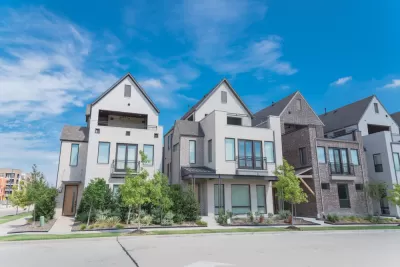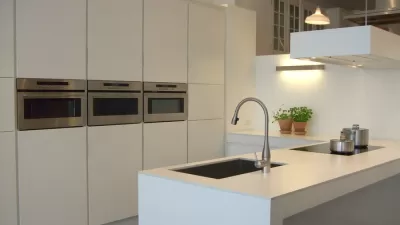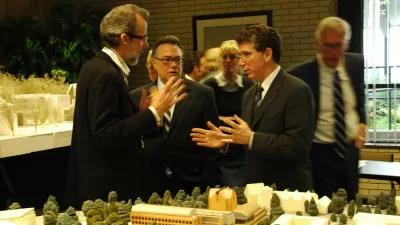Mass-market production and the commodification of housing has led to a ‘flattening’ of design into a limited set of bland, homogeneous options.

In a piece for the Dallas Morning News, architecture critic Mark Lamster describes what he calls “The Flattening” of American culture, wherein products such as cars and houses that once featured unique designs are increasingly similar to each other.
Lamster writes, “To drive around Dallas (or any American city) is to be confronted by an endless series of cheaply constructed apartment blocks, three to five stories in height, with clunky beige bays that stretch for blocks on end.” To Lamster, this sameness is “an insult to the art” of architecture.
This homogeneity, according to Lamster, boils down to “a conservatism inherent in American culture,” an ethos that is “inherently risk averse.” Meanwhile, a disconnection from the house as a “multigenerational homestead” and its transformation to a commodity encourages builders to try to appeal to as wide an audience as possible with inoffensive, bland designs and cheap, readily available materials.
Not leaving out the workplace, Lamster also critiques the modern office tower, which “has likewise become a cliche repeated ad nauseum.” Modern design, Lamster argues, “is almost entirely driven by economics.”
The drive to maximize short-term profit pervades all aspects of society, Lamster argues, recommending “a shift in economic policy” that would “incentivize long-term profit over quarterly growth,” although Lamster admits he doesn’t have a suggestion for what this shift would entail. However, the ravages of climate change, which threaten our complacent bubble, could force the kind of broad change required to snap us out of the comfortable, but bland, status quo.
FULL STORY: Why does everything look the same in North Texas? Blame the ‘flattening’

Planetizen Federal Action Tracker
A weekly monitor of how Trump’s orders and actions are impacting planners and planning in America.

Map: Where Senate Republicans Want to Sell Your Public Lands
For public land advocates, the Senate Republicans’ proposal to sell millions of acres of public land in the West is “the biggest fight of their careers.”

Restaurant Patios Were a Pandemic Win — Why Were They so Hard to Keep?
Social distancing requirements and changes in travel patterns prompted cities to pilot new uses for street and sidewalk space. Then it got complicated.

California Homeless Arrests, Citations Spike After Ruling
An investigation reveals that anti-homeless actions increased up to 500% after Grants Pass v. Johnson — even in cities claiming no policy change.

Albuquerque Route 66 Motels Become Affordable Housing
A $4 million city fund is incentivizing developers to breathe new life into derelict midcentury motels.

DC Area County Eliminates Bus Fares
Montgomery County joins a growing trend of making transit free.
Urban Design for Planners 1: Software Tools
This six-course series explores essential urban design concepts using open source software and equips planners with the tools they need to participate fully in the urban design process.
Planning for Universal Design
Learn the tools for implementing Universal Design in planning regulations.
Heyer Gruel & Associates PA
JM Goldson LLC
Custer County Colorado
City of Camden Redevelopment Agency
City of Astoria
Transportation Research & Education Center (TREC) at Portland State University
Camden Redevelopment Agency
City of Claremont
Municipality of Princeton (NJ)





























